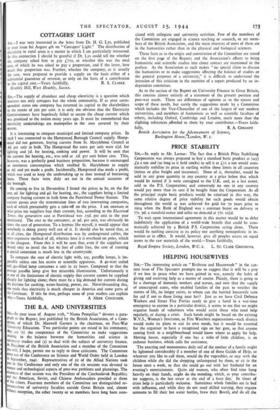THE B.A. AND UNIVERSITIES Suts—In your issue of August i
ith, " Numa Pompilius " devotes a para- graph to the Report, just published by the British Association, of a Com- mittee, of which Dr. Maxwell Garnett is the chairman, on Post-War University Education. Two particular points are raised in his 'comments; ihey are (r) the competence of the Committee to make suggestions relating to the balance between the humanities and science in University studies and (2) to deal with the subject of university finance. As President of the British Association and a member of the Committee 100 will, I hope, permit me to reply to these criticisms. The Committee out of the Conference on Science and World Order held in London 111 September, 1941. Representatives of 22 of the Allied Nations took Pan in this Conference and only one of the six sessions was devoted to science and technological aspects of post-war problems and plannings. The
an of that session was the President of the Czechoslovak Republic; md the American, Soviet, and Chinese Ambassadors presided at three
the others. Fourteen members of the Committee are distinguished re- Presentatives of university faculties outside Great Britain and, almost .thunt exception, the other twenty or so members have long been asso-
ciated with collegiate and university activities. Few of the members of the Committee are engaged in science teaching or iesearch, or are mem- bers of the British Association, and the main interests of most of them are in the humanities rather than in the physical and biological sciences.
These facts as to the origin and constitution of the Committee are stated on the first page of the Report; and the Association's efforts to bring humanistic and scientific studies into closer contact are mentioned in the preface. As the Association as such makes "no special claim to discuss the humanities or to make suggestions affecting the balance of studies or the general purposes of a university," it is difficult to understand the intrusion of this criticism in the mention of a report produced by an in- dependent committee.
As to the section of the Report on University Finance in Great Britain, this consists almost entirely of a statement of the present position and post-war needs. There are differences of opinion as to die nature and scope of these needs, but surely the suggestions made by a Committee which includes the Vice-Chancellor of one of the largest of our modern universities, and members of humanistic as well as scientific faculties of others, including Oxford, Cambridge and London, merit more than the slighting references afforded to them by your contributor.—Yours faith-


























 Previous page
Previous page